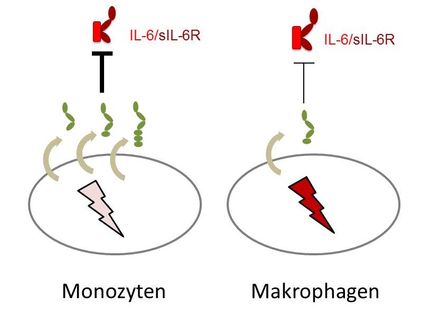Targeted blocking of inflammatory messenger by tablet for the first time
In a clinical phase 2 study, a research team has demonstrated the effectiveness of an IL-23 blocking treatment against psoriasis, which is administered orally
A promising approach for the treatment of chronic inflammatory diseases involves modern, targeted therapies that inhibit inflammatory messengers, so-called cytokines, or their signaling pathways, and thus block inflammation without interfering with other processes. As a result, they are usually more effective and better tolerated than older, non-targeted treatments. However, so far the approved medications based on blocking cytokines have one disadvantage: they can only be administered by injection or infusion. Researchers have now successfully tested a new medication for the first time on patients with Psoriasis vulgaris, which specifically blocks the cytokine IL-23 and can be administered orally, i.e. in tablet form. The results of this phase 2 study were recently published in the New England Journal of Medicine, with the participation of the Kiel dermatologist Professor Sascha Gerdes, a member of the Cluster of Excellence "Precision Medicine in Chronic Inflammation" (PMI).
Clinical study involving Kiel
"We were able to show that the new medication, taken as a tablet, is effective against psoriasis vulgaris at the doses tested, and the side effects are low. In specific terms, this means that the symptoms, such as skin redness and swelling, flaking and itching, decreased significantly within a few weeks and in many cases they also disappeared completely," reported Gerdes, head of the Clinical Study Center for Inflammatory Skin Diseases and deputy director of the Department of Dermatology, Venerology and Allergology at the University Hospital Schleswig-Holstein (UKSH), Campus Kiel. "Thus, for the first time, we have an effective treatment based on cytokine blocking that can be administered orally. This is novel in all areas of inflammatory medicine," continued Gerdes, who led the clinical trial for all participating study centers in Germany in the current international study. Patients at the UKSH in Kiel were also involved in the study.
The molecular composition enables oral administration
Psoriasis vulgaris, also simply called psoriasis, is a chronic inflammatory, non-contagious disease that usually manifests itself through itchy and flaky, red skin, but it can also affect other organs, such as the joints. In Germany, two million people are thought to be affected. The disease is caused by a misdirected immune response, which means that the immune system overreacts and causes an unwanted inflammation of the skin. The cytokine Interleukin 23, or IL-23 for short, plays an important role in the inflammatory process, making it an important therapeutic goal for targeted medications. However, all approved therapies which specifically block IL-23 or its signaling pathway can to date only be administered by injection to treat psoriasis.
"These existing cytokine-blocking therapies are based on relatively complex antibodies or fusion proteins, i.e. large protein molecules. They cannot be taken orally, as they are broken down directly in the mouth and stomach and thus become ineffective," explained Gerdes. "The new medicinal substance we tested specifically blocks the IL-23 receptor and thus the inflammatory IL-23 signaling pathway. What’s special is that it’s significantly smaller than the previously approved medicinal substances and thus – when taken as a tablet – it is not broken down on the way through the digestive tract, but still arrives at the inflammatory cells intact and in sufficient quantities," added Gerdes. Taking medication in tablet form is not only generally more pleasant for those affected, it also makes them more independent on an individual basis. In addition, in contrast to existing cytokine-blocking therapies, the tablets do not need to be refrigerated.
Also relevant for other chronic inflammatory diseases
"This study is an important step in the development of therapies for chronic inflammations. For the first time, an oral therapy, i.e. a tablet, has been used to specifically block a cytokine signaling pathway and thus combat the inflammation. This is not only important for psoriasis, but also far beyond," emphasized Professor Stefan Schreiber, spokesperson for the Cluster of Excellence "Precision Medicine in Chronic Inflammation". IL-23 also plays a decisive role in other chronic inflammatory diseases. Several currently approved and highly effective drugs for chronic inflammatory bowel diseases and rheumatic diseases specifically block IL-23, i.e. they use a very similar mechanism of action as the new medication under investigation. But to date, all these approved medications can only be administered by injection or infusion. "Since we know that some other inflammatory diseases are based on the same mechanisms as those in psoriasis, we can assume that the medicinal substance that has now been successfully tested in psoriasis could also work for these diseases," continued Schreiber.
Phase 3 study already in the starting blocks
Now that the present phase 2 study has shown in principle that the oral medication is effective in patients, the results will be confirmed in a much larger and longer-term phase 3 study. In this final clinical trial phase before the drug can be approved, multiple studies will be conducted involving more than 1,500 patients at different study centers worldwide over a period of several years, in order to demonstrate the efficacy and tolerability precisely and in detail. "In the Department of Dermatology at the UKSH's Kiel campus, we have already admitted the first patients with psoriasis to this new study phase, which will start in a few weeks," said Professor Stephan Weidinger, director of the Department of Dermatology, Venerology and Allergology at the UKSH, Campus Kiel, professor at the Faculty of Medicine at Kiel University (CAU), and board member of the Cluster of Excellence PMI.

























































